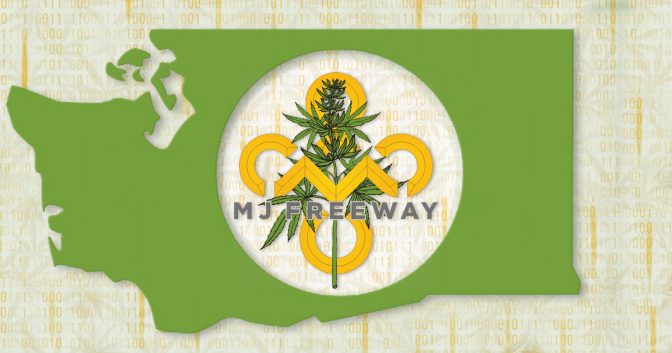Problems Plague MJ Freeway’s Leaf Data Systems in Washington State

On June 14, the Washington State Liquor and Cannabis Board (LCB) issued a news update to the state’s marijuana industry, alerting them that LCB had received a notice the week before “that there had been unauthorized efforts to tamper with data derived from commercial software that integrates with the state traceability system.”
This is just the latest in a series of troubles for MJ Freeway.
Washington switched over to the their Leaf Data Systems‘ traceability and compliance monitoring software (i.e., seed-to-sale tracking) on February 1. It was breached two days later. Data were stolen and systems were corrupted, disrupting business operations across the state.

Plants with seed-to-sale tracking
LCB took several days to notify businesses of the reason for that disruption, which is standard procedure for the state, probably added to the growing sense of mistrust among businesses toward the state and the Leaf system. LCB’s Marijuana Traceability Project (MTP) noted in a recent quality assurance review that “the security incident right after going live along with the disrupted system workflows and the backlog of responses to phone calls, tickets and bug fixes severely deteriorated the trust that licensees and software integrators had in Leaf Data System, the vendor, and in WSLCB staff.”
Communications from the state have improved, which is helping with those trust issues, but the question remains: Will better communication be enough to overcome poor system performance and persistent questions about data security?
According to that MTP report, “At the end of April, 87 high to critical severity bugs remain in the system that require work-around processes until the defect fix can be put into the production environment. Development and testing continues for a hot fix code release that is needed to resolve outstanding workflow blockages identified just after implementation related to QA test results, sales reports and units of measure. This release was planned for mid-to-late February and has been repeatedly delayed.”

OZ. Recreational Cannabis in Seattle
Seed-to-sale tracking has its limitations, but if the system itself is faulty then the accuracy of the data that are entered doesn’t really matter. One Washington retailer, Bob Ramstad with OZ. Recreational Cannabis in Seattle, tells Freedom Leaf his inventory data on Leaf and the inventory data on his own system just don’t match up. “For one month, the sales reported in Leaf were 90% of my actual sales and allegedly all medical, which makes no sense, as we are not even medically endorsed,” he explains. “For a shorter period, more recent, sales reported in Leaf were 10% of my actual sales, and again, all medical.”
OZ. RECREATIONAL CANNABIS’ BOB RAMSTED ON LEAF DATA’s SOFTWARE SNAFU: «It’s quite frankly ridiculous.»
The Leaf Data system also includes sales and excise tax reporting. Bad inventory and manifest data could cause some real problems for the state and for businesses in that regard. However, that’s not a problem right now, because that part of the Leaf system isn’t working at all. The MTP report notes: “Similarly, code deployment for additional requirements related to tax and fee functionality has been delayed, after being planned for release by the end of February, more than 60 days ago. Contingency reporting remains in effect for sales and excise tax reporting. It is still not clear when the fee functionality will be available in Leaf Data Systems.”
According to the LCB website on June 21, “Retail licensees will need to manually report until further notice.”
“Now I have to fill out a report manually,” says Ramstad, “which isn’t a big deal, but it does mean that someone could easily game the system or simply not send returns in and the state would have no way of knowing for sure what was owed. It’s quite frankly ridiculous, especially given that the LCB has stated that enforcement of payment of cannabis tax is a priority now.”
The lack of a working seed-to-sale tracking system is more than just an inconvenience. A big reason these systems exist in the first place is to reassure the Feds that states are working to prevent illegal diversion. “We don’t have that sort of system right now at all,” he adds. “It’s jeopardizing the existence of the entire industry in Washington state.”
Flowhub’s cultivation NUG allows users to scan plant tags and report compliance data automatically back to state regulators. (PRNewsfoto/Flowhub)
Even if MJ Freeway does get its act together, it’s got more problems on the horizon: big players are starting to enter the field. In April, cannabis compliance software maker FlowHub announced a partnership with HP (formerly Hewlett Packard) to integrate its software with HP’s ElitePOS point-of-sale system.
Ramstad, who has a Master’s degree in computer science from MIT, welcomes HP’s move. “I think any legitimate software company can find challenges and opportunity in the cannabis space,” he says. “I was also very interested when Microsoft bought a small startup that did cannabis compliance and tracking a while back. That outfit used Azure and so it was a natural match for them.”
Time will tell whether MJ Freeway can survive this latest debacle. With companies like HP and Microsoft getting into the business of providing services to the cannabis industry, it’s a whole new ball game.
More Articles About Seed-to-Sale Tracking
Interview with BioTrackTHC’s Patrck Vo
Inside Seed to Sale: How It Works
If you enjoyed this Freedom Leaf article, subscribe to the magazine today!

